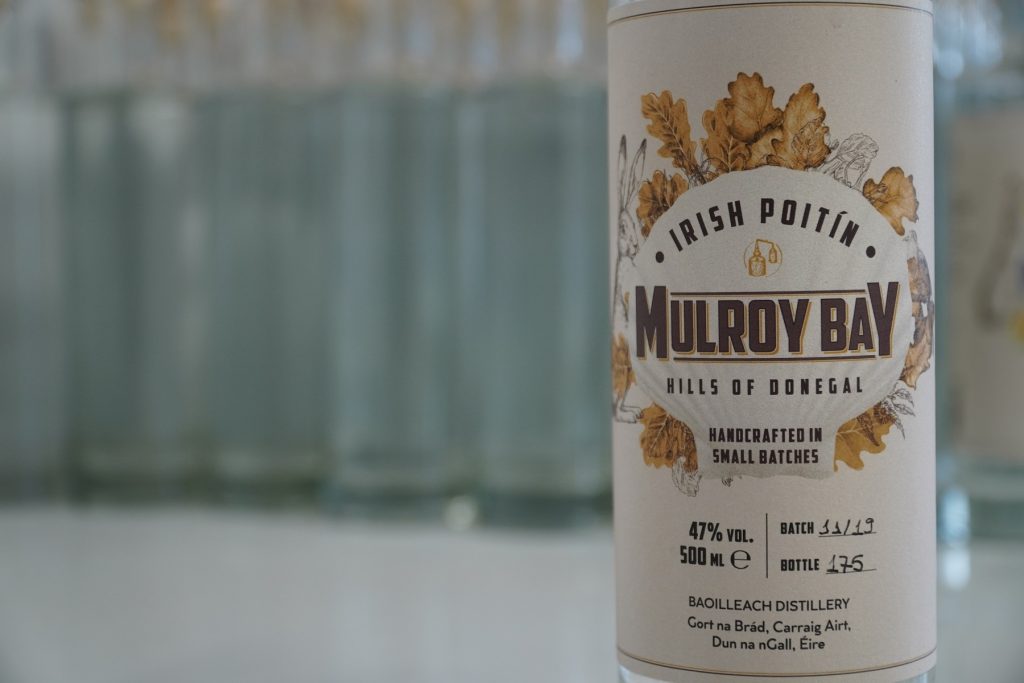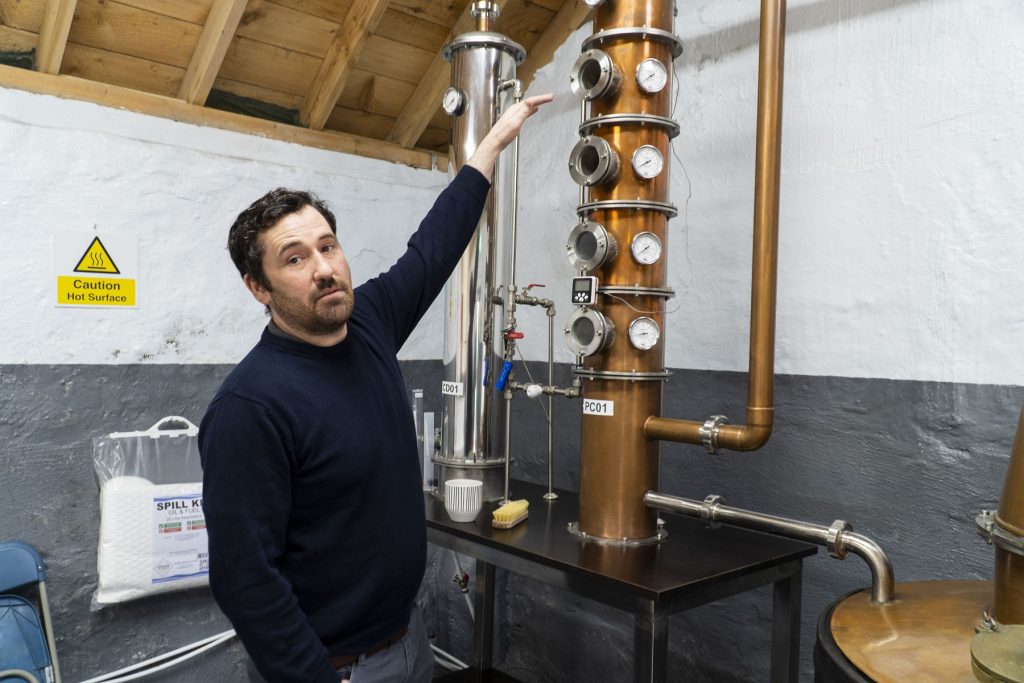It was a St Patrick’s Day like no other.
March 17th, 2020 – No parades, no pubs, no craic.
Yet, I find myself in a century-old cottage along the winding lanes
of Gortnabrade, Carrigart, overlooking the Harry Blaney Bridge
and the stunning vista of Mulroy Bay, in one of Ireland’s few legal
poitín distilleries.
Slainté.
The old red and white house and shed, once a place where local horses were shod in times
gone by, is now the centre of a new craft in the area. Or maybe that should be the return of an
ancient Irish craft now being brought into the modern era.
by Eamonn McFadden
I’m here to meet Michael O’Boyle, founder of Baoilleach Distillery, what he describes as “Donegal’s first grain to glass craft distillery”. After arriving, first thing was to wash hands
with a bacterial slaying high percentage alcohol (naturally) and vinegar mix and we observed
social distancing throughout, which reflected well the high levels of cleanliness and order in
the premises kept by Michael.
Michael hails from Ballybofey originally and set up the distillery a few years ago after relocating
to the Carrigart area with his family.
The property he acquired came with a beautiful old former long cottage. Once a thriving family home it laterally was used as a cow shed before he moved in and repurposed the building into a craft distillery producing small batches of very high quality spirits.
Micheal explains that while there is great depth to the lore and mystic of the infamous Irish drop, alas, he has no age-old family recipe hand-ed down from previous generations to brew up
and serve to the current generation.
But it was far from home shores that he got the inspiration for his fledgling distillery business.
It was while living in the land of the ‘Long White Cloud’ – New Zealand – that he first be-
came acquainted with small scale brewing and distilling.
He explains: “I was over in New Zealand for a few years. Over there home distilling is every-
where. There are no laws against it and it is not banned. It is totally legal and they have a lot of
people doing it. The same with brewing beer, people just do it in their own homes. They get a few guys together and have the craic. It is be- cause it is so rural in many places, your near-
est supermarket could be 30 miles away. That is where it originally came from for me. It is a bit
like eastern Europe where they still have that tradi- tion of distilling. I’m sure it is still here as well but it is just not legal in most cases. It is more of an un-
derground thing.
“Over there (in New Zea- land) they are well set-up for it with home brew
stores and you can get all the barley and all the yeast, all the ingredients you need, then it’s up
to yourself to configure up a wee pot and just do it. It started that my- self and few of the lads
began doing it and we started to produce some nice, drinkable, alcohol. Every couple of months
we would try a new batch and try different things with it. Then I came back and worked in the UK for a while. When I’d come home then I would play around with it and then it just kind of developed. It got to the stage where I had this space and I thought why not set it up here.
“I know the whole craft spirits thing started recently and is popular, although my own personal
interest is things like aged spirits – aged poitíns and aged rums. That is when you make them and put them into barrels. That’s maybe more of a long term thing but for now I just make the gin and the poitín. That’s what keeps the lights on and hopefully people are enjoying the drinking of it too.”
The impressive copper and stainless steel still Michael uses to create his own brands of “Mulroy Bay Gin & Poitín” came from Serbia and is capable of creating various similar type drinks.
He said: “This is all gas fired and direct flame. Really you are going back to how it used to be done.”
He adds that he can produce between 60 and 80 bottles of spirits per day but with the whole process of preparing and production he averages about 200 bottles per week when he is in full production.
“It is just craft spirits. That’s all it is. That is where I’m going with this and, unfortunately, the way the Government has it set up I have to pay all the same taxes as other producers and that makes the cost of it look a bit higher but that’s just the way it is.”
Michael highlights that for many, the culture of drinking large volumes is a thing of the past, and
with this change people are looking for higher quality and flavour when they do imbibe socially,
either at home or on a night out. “I think that more people are now enjoying one or
two drinks rather than guzzling down ten. Who wants all the hangovers? Who wants all the messi- ness? I do think people are going towards the small levels of consumption and we are trying to bring the quality a little bit higher.”
While the heady mix of location and folklore could add up to a marketeer’s dream picturing a bubbling poitin still in the wild remote hills of Donegal but Michael is quick to point out that all this fell into place and it wasn’ designed to impress anyone from that perspective. He prefers to let the quality and flavours do the talking for his unique range.
“You have to have a good story but I’m coming from the direction that this is just what it is and who we are. It is not a marketing gimmick. It is made along the banks of Mulroy, it is made in an old cottage but I’m only saying what it is. If people like that then that is a good thing but it is not really going to change too much what we do here. It still will be the same thing. It is just small scale production but I am trying to make a living out of it through time. I doubt we will ever get up to large scale pro- duction. I mean, when you think about it, like certain things that used to go on before, people used to go to a shoemaker or a tailor, these types of things might just start to emerge slowly again. Before they became so uneconomical, but now maybe with more technology and a better supply chains, you just might be able to bring some of these things back.”
“It has taken me almost three years to get to this stage. There is a lot of red tape at the start. You have to do all the right things from the very beginning and that is fair because it only brings good stand- ard into it and that’s what you have to do.Getting it started was the hardest part”
Michael explains, at present, he is balancing work as a construction site engineer, with the slow organic growth of the distillery, as this means he can devote his brewing time into creating high quality produce.
“Time is the important thing with aged spirits. You can get so much more flavour into aged spirits. Like poitín, you can sip it or you can have it with ice, but with that it is becoming more of a cocktail drink. Gin is of course a cocktail drink, like gin and tonics, but to get to that sipping drink you have to age it to get flavour into it and get quality into it.”
While many struggle to get their head around the very fact that poitín production was kept hidden and secret for centuries in Ireland, yet is now read-
ily available in bars and off-licenses.
The image of shadowy characters heading through quiet glens and valleys to set their pots into pro- duction well away from prying eyes is embedded in Irish folklore and culture with poitin and poitin-makers regularly featuring in pen and verse of poetry, song, stage and screen over many years.
But now a special legal decree for the beverage under European law was granted that gives the lively spirit the same legal and cultural footing as other geographically located drinks.
Just as the famed grapes of the Champagne region in France are the only ones who can use the distinguished title for their celebrated beverage, so too the Irish drop cannot be distilled anywhere else in the world, other than Ireland, and use the name of ‘poitin’.
While it was illegal in Ireland for centuries, it was only legalised formally in 1997. Since Poitín has been legalised it has been granted Geographical Indicative Status by the EU. This means that from 2008 on, real poitín can only come from Ireland. However, it is still illegal in Northern Ireland.
Michael adds: “The Government got this GI status for poitín so there is a piece of legislation attached to its production to try and keep its quality and the authenticity there. You have to make it in a certain way, you have to label it in a certain way. Then when it comes to aged poitín, because they know I could compete with the whisky industry with aged poitin,
so we can only age it for ten weeks. It does give it a flavour but not like you could if you aged it longer but a lot of poitin drinkers want that overbearing alcohol flavour. That’s what poitín is. There are lots of poitíns out there at 40% and people won’t even look at them.”
The drink has its own culture of aficionados around Ireland and further afield and Dublin even boasts its own poitín bar, which Michael’s Mulroy Bay brand sits proudly amongst the others on the shelves.
He adds that he understands the more traditional underground scene of poitín production is still alive and well in many parts of the country. He, however, is focused on the future of his business and the three products he distills in Gortnabrade which are now available in many places from Tory Island to Dublin.
His Mulroy Bay Irish Poitín is created from a mash of Irish Malted Barley and Potato which is slowly fermented and then distilled using a direct fire still.
The distillation is done slowly, taking 7-9 hours depending on mash ABV. Several distillation batches are needed to produce a bottling batch of 200 – 250 bottles and it is 47% volume.
His Mulroy Bay Irish Gin is created from a mash of Malted Barley which is slowly fermented and distilled into a neutral grain alcohol. This spirit is then slowly distilled in a Pot still with botanicals, some of which are hand foraged locally to produce a more flavoured fragrant Irish Gin. Produced in batches of 200-250 bottles. It is bes enjoyed with a light Tonic and small slice of Lemon.
And, as Micahel outlined his passion for aged spirits, his Mulroy Bay Oak Finish Irish Poitín is Baoilleach Distillery’s Original Irish Poitín which has been held in oak wood barrels for up to 10 weeks.
The barrels are small in size and impart a full and mellowed oak finish to the spirit. Strengths will range between 40 to 64% Vol.
With Irish, and global, drinking habits changing from the mass produced beer and spirits to the micro-brewed and small batch distilling, this unique taste of Donegal could well end up in all corners of the world from its humble beginnings along the shores of Mulroy Bay.
To find out more see www.baoilleachdistillery.ie



